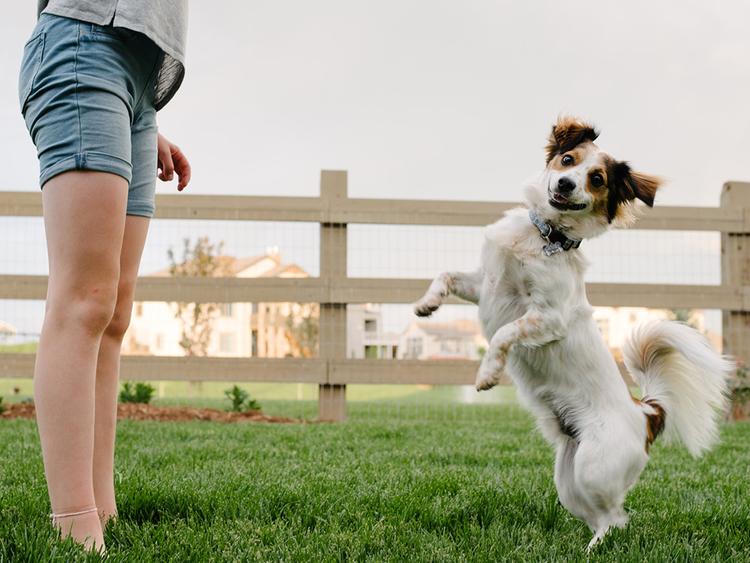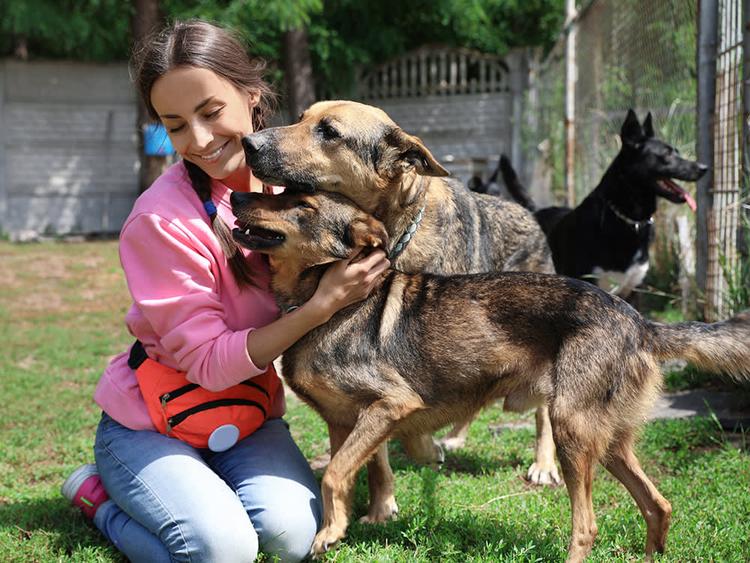Which Dog Breeds Are Most Commonly Found in Shelters?
These dog breeds often fill shelters — discover the reasons behind their frequent surrenders.
These dog breeds often fill shelters — discover the reasons behind their frequent surrenders.
by Katie Koschalk, | September 30, 2024

Thitisan / Shutterstock
When you think of a shelter dog, a mixed-breed pup with an unknown background might come to mind. While mixed breeds are common in shelters, purebred dogs, like German Shepherds and Chihuahuas, also find themselves there, often for reasons out of their control. This is not only an unfortunate outcome for the dogs, but also contributes to pet overpopulation in shelters.
Understanding which breeds are commonly found in shelters (and the reasons why) can provide valuable insights into the importance of responsible dog adoption. So, which dog breeds are you most likely to spot at your local shelter? We pulled data from Adopt a Pet, among other sources, to bring you this list.
It’s easy to assume that any dog who ends up in a shelter has behavioral issues. While some dogs do, the reality is far more complex. Let’s explore some key reasons why certain breeds are overrepresented in shelters.
When a particular breed becomes popular, usually due to celebrities and media exposure, it often leads to a surge in demand. People rush to bring home a dog of the same breed, but not everyone is prepared for the responsibilities that come with caring for a dog, especially one with specific needs. As a result, many of these trendy dogs eventually end up in shelters.
Popular breeds often suffer from overbreeding, especially by unregulated and irresponsible breeders and puppy mills looking to make a quick profit. The sheer number of puppies produced due to overbreeding can flood the market, leading to more dogs than there are homes to take them in. This increases the chances that these dogs will end up in shelters.
Even well-meaning people who initially adopt or buy these dogs may later realize they aren’t equipped to care for them and ultimately give them up to a shelter — exacerbating this problem.
In some areas, certain breeds are subject to breed-specific legislation. This refers to laws and regulations that restrict or ban certain dog breeds due to perceptions that these breeds are inherently dangerous or aggressive. These laws typically target breeds like Pit Bulls, Rottweilers, and others who are considered “bully breeds.”
Breed-specific legislation can include restrictions on ownership, mandatory muzzling in public, higher insurance premiums, housing restrictions, or outright bans in specific areas. While these laws intend to reduce dog attacks, they unfairly target specific breeds rather than addressing individual dog behavior and responsible pet parenthood.
Breed-specific legislation can lead to people surrendering their dogs if they’re unable to keep them due to housing restrictions or other legal issues.
Some breeds, especially working dogs, need a lot of exercise and mental stimulation to thrive. When pet parents aren’t fully aware of these needs (or don’t have the time or energy), dogs can become bored, anxious, or even destructive. As a result, they often end up in shelters simply because their energy and attention requirements were not met.
Changes in life circumstances, such as moving to a new home, financial hardships, or family dynamics, can make it difficult for pet parents to care for their dogs. Larger breeds, or those who require a lot of care and space, are more likely to be surrendered when their humans’ situations change.
Shelters take in a wide variety of dog breeds, with some appearing more frequently than others. Below are the 15 most common dog breeds you’ll likely find in shelters, along with insights into why these particular breeds often need a second chance.

Bill Anastasiou / Alamy Stock
Pit Bulls are one of the most common breeds found in shelters, largely due to breed-specific legislation and the dogs’ misperceived reputations. Despite these dogs’ loving and loyal nature, many people are hesitant to adopt Pit Bulls due to unfounded assumptions that they’re dangerous.
In reality, Pit Bulls tend to be affectionate, gentle, and playful. Unfortunately, misconceptions about them, coupled with housing restrictions and legal bans, result in a high number of Pit Bulls in shelters.

Labradors are one of America’s most popular breeds, known for their friendly nature and suitability as family pets. Their popularity means more people adopt or buy them. But with more Labs in homes, there is naturally a higher number being surrendered due to unpreparedness (like, they tend to be high-energy dogs) or life changes.

Chihuahuas are often victims of overbreeding and impulse-buying due to their small size and “cute” appeal. Despite being one of the smallest breeds, they have bold personalities and can be quite vocal (although this varies from dog to dog).
Many people adopt Chihuahuas without considering their temperament and the kind of training and socialization they need. This unfortunately results in these excellent pups ending up in shelters.

Known for their muscular build and strong appearance, American Staffordshire Terriers are often unfairly stereotyped as aggressive, leading many to avoid adopting them. However, as with any breed, with proper training and care, they can be loyal, gentle, and friendly pets. This breed also faces issues with breed-specific housing restrictions, which is unfortunately another reason why they end up in shelters.

Boxers are energetic, affectionate dogs known for their playful nature and love of human interaction. Their high energy levels and strong desire for attention can be overwhelming for some people. As a result, they’re often surrendered when people realize they can’t meet the breed’s exercise, attention, and training needs.

German Shepherds are among the most intelligent dog breeds, often serving as police or service dogs. However, their high intelligence comes with a need for extensive training, socialization, and mental stimulation. Many pet parents are unprepared for the responsibility of caring for such a sharp-minded and active breed. When their needs aren’t met, German Shepherds may become anxious or destructive, causing them to end up in shelters.

Australian Cattle Dogs are very smart, energetic, and bred to work long hours herding livestock. As such, they need jobs or activities to stay engaged. When adopted by families that underestimate their physical and mental needs, these dogs can become frustrated and develop behavioral issues like nipping or excessive barking. Many Australian Cattle Dogs find themselves in shelters when people can’t keep up with their intense exercise requirements or working-dog mentality. These smart dogs are a great addition to active families, especially when you give them a job to do.

Huskies are strikingly beautiful dogs with a wolf-like appearance. Many people adopt Huskies for their looks without fully understanding the time and effort required to care for them. Huskies need a lot of exercise and mental stimulation and have a drive to roam. When people struggle to meet their needs, these dogs are often surrendered to shelters.

The American Bulldog can be quite hefty, weighing between 75 and 125 pounds. Their strength and size can make them difficult for some people to manage. Additionally, American Bulldogs are often grouped with “bully breeds” in breed-specific legislation. As a result, they may face legal restrictions, forcing pet parents to surrender them due to housing challenges or local laws.
For those with the space and time to care for this gentle giant, the American Bulldog can make an incredibly loyal and loving companion.

Australian Shepherds are super-smart, agile, driven dogs who often excel in activities such as agility or herding. However, this breed requires a high level of physical and mental stimulation, which is something their parents need to understand. When their needs aren’t met, Australian Shepherds can become bored and develop behavioral issues (like excessive barking) or destructive tendencies, which leads them to shelters.

Since the debut of Snoopy, America’s most famous Beagle, the popularity of this breed has remained strong. Beagles are friendly, curious dogs known for their strong sense of smell and hunting instincts. While they make loving pets, their independent nature and tendency to follow their noses can be challenging for some people to handle. Beagles are also known for being vocal, so it’s important to make sure your housing situation is a fit for this breed.

Border Collies are very smart and require a lot of mental and physical exercise, which can be overwhelming for people who aren’t prepared for such an active dog. Without proper outlets for their energy, they can become understandably frustrated, leading to behavioral issues like excessive barking or destructive behavior. This often results in them being surrendered.

While it may be surprising to see a Golden Retriever in a shelter, it’s actually quite common — especially because the breed and their mixes have soared in popularity in recent years. As more people have sought out these friendly and laid-back dogs, there has been a rise in both intentional breeding and impulse adoptions, which can lead to surrender when families find themselves unprepared to care for them.

Poodles have surged in popularity due to their intelligence, “hypoallergenic” coats, and adaptability. But many people don’t fully anticipate the physical exercise and mental stimulation needed to keep this breed happy and healthy. Coupled with their grooming needs, it’s not uncommon for Poodles to end up in shelters when people find themselves unprepared for the commitment.

Mixed-breed dogs, also known as mutts, make up the majority of dogs in shelters. These mixed pups — often a combo of the dogs on this list — are typically the result of accidental or unplanned litters. However, mixed-breeds can make wonderful loving companions. Also, they’re generally healthier than purebred dogs, because they have less risk of inheriting breed-specific diseases.
Yes, an overwhelming amount of surrendered dogs are perfectly safe to adopt. Many of the dogs you find in shelters are abandoned through no fault of their own. These dogs are often loving, loyal companions waiting for the right person to give them a second chance. (If they happen to have any behavioral issues, the shelter or rescue workers will let you know.) Use Adopt a Pet to search for shelter dogs near you, and meet them in person to learn more about their personalities.
The most surrendered dog breeds include Pit Bulls, Labrador Retrievers, Chihuahuas, German Shepherds, Huskies, and mixed breeds. Popularity, overbreeding, breed-specific legislation, and misunderstood needs often contribute to their increased presence in shelters.
Pit Bulls face housing restrictions and misconceptions about their temperaments. Many are surrendered due to these legal and societal challenges, despite being loving, loyal pets when properly trained and socialized.
Yes, purebred dogs are often found in shelters. Popular breeds — such as Huskies, German Shepherds, and even Golden Retrievers — can be surrendered due to lifestyle changes and unprepared guardians.
A Canine Identity Crisis: Genetic Breed Heritage Testing of Shelter Dogs
Phenotypic Characteristics Associated with Shelter Dog Adoption in the United States

Katie Koschalk is a freelance writer based in Northern California. Fusing her love and knowledge of animals with her journalism degree and years of professional writing, Katie is dedicated to improving the lives of pets and their caretakers by sharing helpful and accurate information. When she’s not at her desk, you can find her exploring trails with her Aussie, Hunter, cooking plant-based meals, and talking to her two cats, Jax and Sadie, in really ridiculous voices.

Shelters & Rescue

Shelters & Rescue

Adoption Advice

Adoption Advice
Wondering where to go to rescue a pup, and what to do once they’re home? We’ve got all the answers.

Adoption Advice
Learn the many benefits of adopting a shelter dog, and why giving a dog a second chance at a home is truly rewarding.

Adoption Advice
Learn what a rescue dog is and why these pups make the best buddies.

Shelters & Rescue

Shelters & Rescue
Debunk a few animal shelter myths and learn the benefits of adopting from a shelter or rescue group.

Adoption Advice
Whether we’ve overcome black dog syndrome or not, plenty of black shelter dogs still need loving homes.